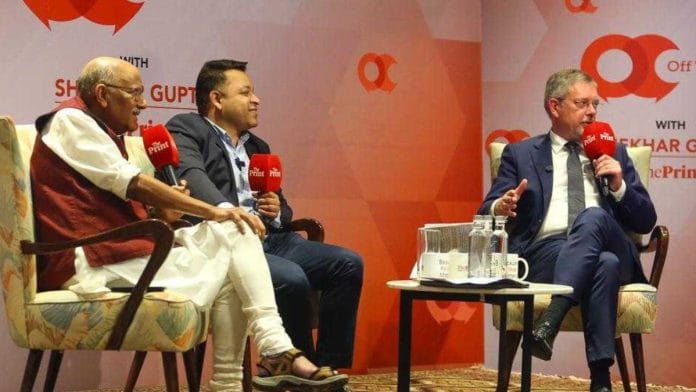New Delhi: President Vladimir Putin’s visit to India later this year will mark a “major milestone” in bilateral relations and help accelerate efforts to expand trade beyond oil, Russian Ambassador to India Denis Alipov said Tuesday.
Speaking at ThePrint’s Off the Cuff in Gurugram, Alipov asserted the two countries are working on new agreements that will deepen economic cooperation and pave the way for new areas for collaboration.
“The visit of President Putin, which we expect in December, will be a major event between our two countries this year. We are in intense discussions with the Indian government, the business community and various agencies on a number of bilateral arrangements. Some will materialise during the visit while others will continue to be developed afterward,” he said.
The envoy’s remarks come at a time when the Trump administration announced fresh sanctions on Russia’s oil majors—Rosneft and Lukoil—a move that has prompted Indian companies to look beyond Russian crude.
Alipov said Tuesday that trade diversification and tariff reduction are priorities, with negotiations for a Free Trade Agreement between India and the Eurasian Economic Union (EAEU) expected soon.
“Once we have the agreement in place, trade volumes will increase by at least 30 percent,” Alipov noted, emphasising untapped sectors, such as manufacturing, agriculture and services.
He added that India-Russia relations are not defined by oil trade alone.
“We are doing reasonably well in agriculture, but there’s much more potential. India has a lot to offer in ready-made and industrial products, and we see great opportunities for joint ventures both in India and Russia,” he said.
Describing the partnership as resilient, Alipov said Putin-PM Modi talks would signal a new phase in India-Russia ties.
“With lower tariffs, a free trade agreement, and stronger business-to-business cooperation, our partnership will only grow stronger and far more diverse in the years ahead,” he said.
The envoy acknowledged that tariff barriers on both sides have restricted the scope of bilateral trade, which remains well below potential despite relations between Moscow and New Delhi.
“There are high tariffs for Russian products in India, and equally high tariffs for Indian products in Russia. This is an acknowledged issue and one that we are actively working to resolve,” he said.
Beyond commodities, Alipov urged for an exploration into co-manufacturing opportunities, especially in sectors such as engineering, machinery and information technology. “We should pay much more attention to creating the conditions for joint ventures—not only in India, but also in Russia.”
Also Read: ‘If not India, someone else will buy Russian oil,’ says Russian envoy Alipov ahead of Trump deadline
Sanctions ‘a double-edged sword’
Alipov dismissed Western economic sanctions on Russia as futile, calling them a “double-edged sword” that ultimately harms those who impose them.
“This mechanism has exhausted itself long ago. It will not change our foreign policy or deter us from defending our national interests and what we consider of existential importance to us,” he said.
He added there are currently 30,000-plus sanctions targeting Russia, but these have failed to weaken the country.
“In the end, these measures will prove detrimental to those who introduced them,” he said, asserting that punitive restrictions have instead driven Moscow to strengthen ties with partners like India.
(Edited by Prerna Madan)







